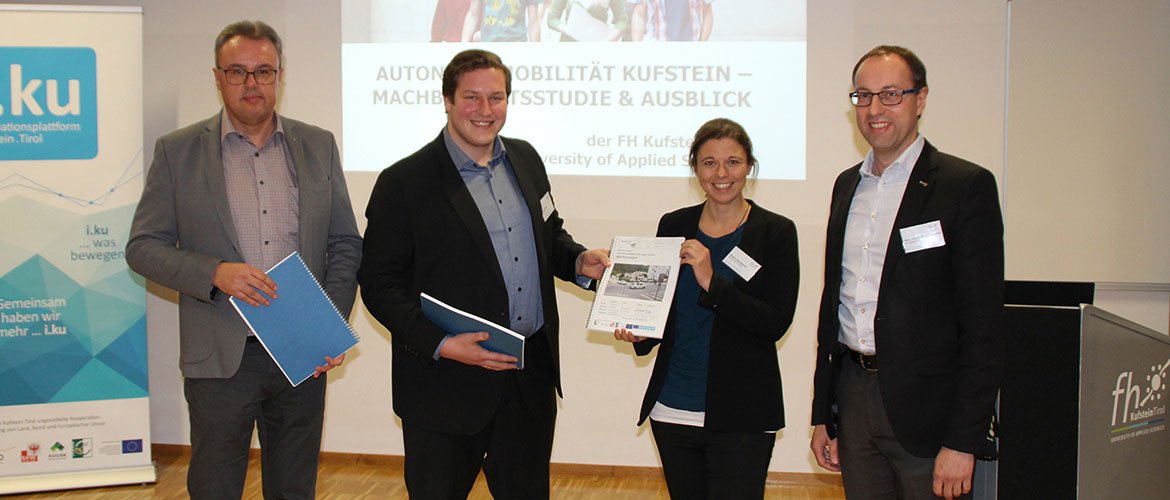
Three projects pave the way for autonomous mobility in Kufstein
The Kufstein district has great potential for exploring and especially also for applying automated and autonomous mobility systems in many areas: in road traffic, agriculture or in aerial applications. In a LEADER-funded feasibility study, FH Kufstein Tirol, DLR Gesellschaft für Raumfahrtanwendungen (GfR) mbH and Municipal Works Kufstein established the preconditions for the specific examination of such applications. The entities ascertained technical requirements and elicited validation regions. Especially the geographical variance between valleys, mountains, rivers and land make the Kufstein region an attractive role model. Additionally, components for a digital infrastructure are already in existence and available for autonomous traffic.
“The exploration of autonomous mobility systems offers great opportunities for the future of the Kufstein district. Together with its project partners, FH Kufstein Tirol provides a crucial contribution,” said District Governor HR Dr. Christoph Platzgummer enthusiastically.
Examination of automated driving and drone flights
The lighthouse project funded by the province of Tirol brings four strong partners together. In addition to FH Kufstein Tirol and DLR GfR mbH, SWARCO AG and Graz University of Technology (TU) joined the exploration team for autonomous mobility systems. In the coming year, the partners want to establish a mobile infrastructure in order to test specific applications such as drone flights or automated driving. Another goal of the project is the presentation of a generally valid, technological basis for safe mobility offers.
A specific application case is the analysis of street traffic with drones. “We jointly also want to support regional companies and organizations in establishing this infrastructure. The Voluntary Fire Brigade Kufstein and the Municipal Works Kufstein have already expressed their interest,” explained Project Manager and Rector of FH Kufstein Tirol Prof. (FH) Mario Döller. Prof. Christian Arbinger, head of the department of navigation services at DLR GfR mbH, added: “Our priority is a coherent and holistic safety concept. We are contributing our vast experience with flight safety, experience that has been helpful in safely bringing flight guests to their destinations for decades.” “As a partner, we support the project with the goal of safely advancing new mobility within a digital infrastructure environment in a user-oriented manner for the Kufstein region,” said Head of Research & New Technologies of SWARCO AG Andreas Schmid.
DataSME – Data science for the industry (Interreg Austria-Bavaria)
In another follow-up project to the feasibility study, FH Kufstein Tirol wants to establish a network between the economic sector and industry and also ensure a knowledge transfer in the area of mobility. The following entities are involved as partners: FH Vorarlberg with WISTO Vorarlberg, Kempten University of Applied Sciences with Bayern Innovativ, FH Kufstein Tirol with i.ku – Innovation Platform Kufstein and Standortagentur Tirol, FH Salzburg and the University of Salzburg with ITG Salzburg and the University of Passau with INN.KUBATOR.
Drone center at the University of Applied Sciences
The Tyrolean Science Fund also supports FH Kufstein Tirol in the acquisition of drones and their usage in apprenticeships as well as with the evaluation of application cases. “We want to establish the first drone center in Western Austria at the university in order to create a research and learning environment for science students. We align ourselves according to the example of Graz University of Technology, which has already realized such a center,” said University of Applied Sciences Rector Döller.
